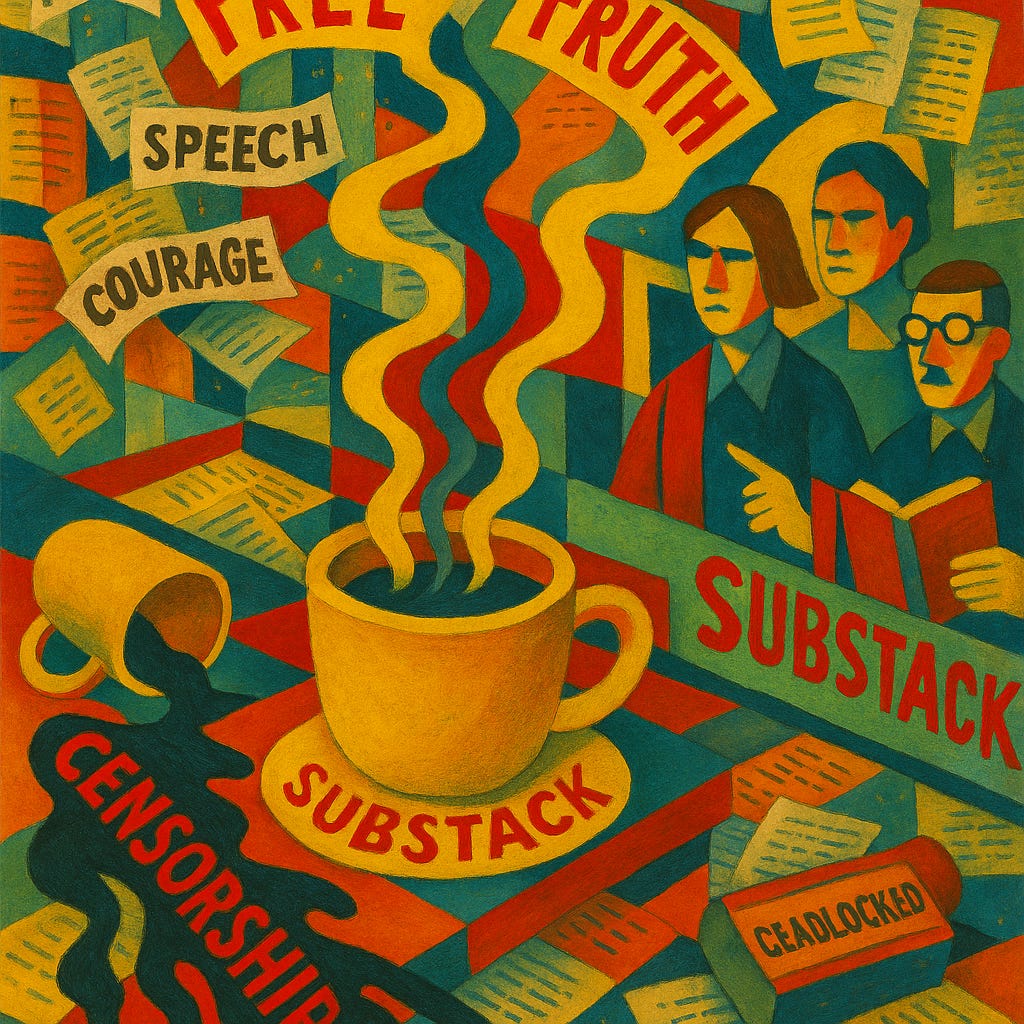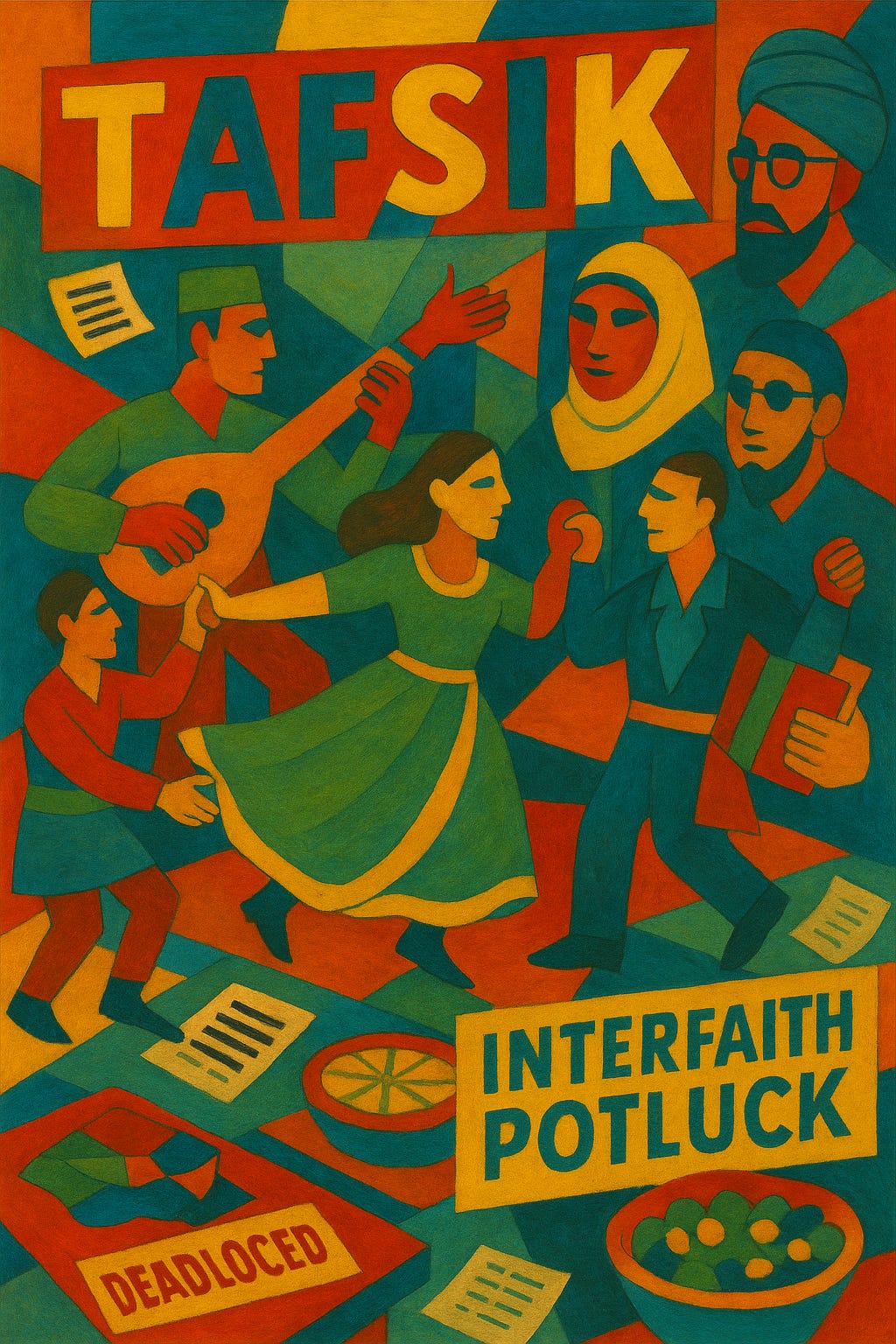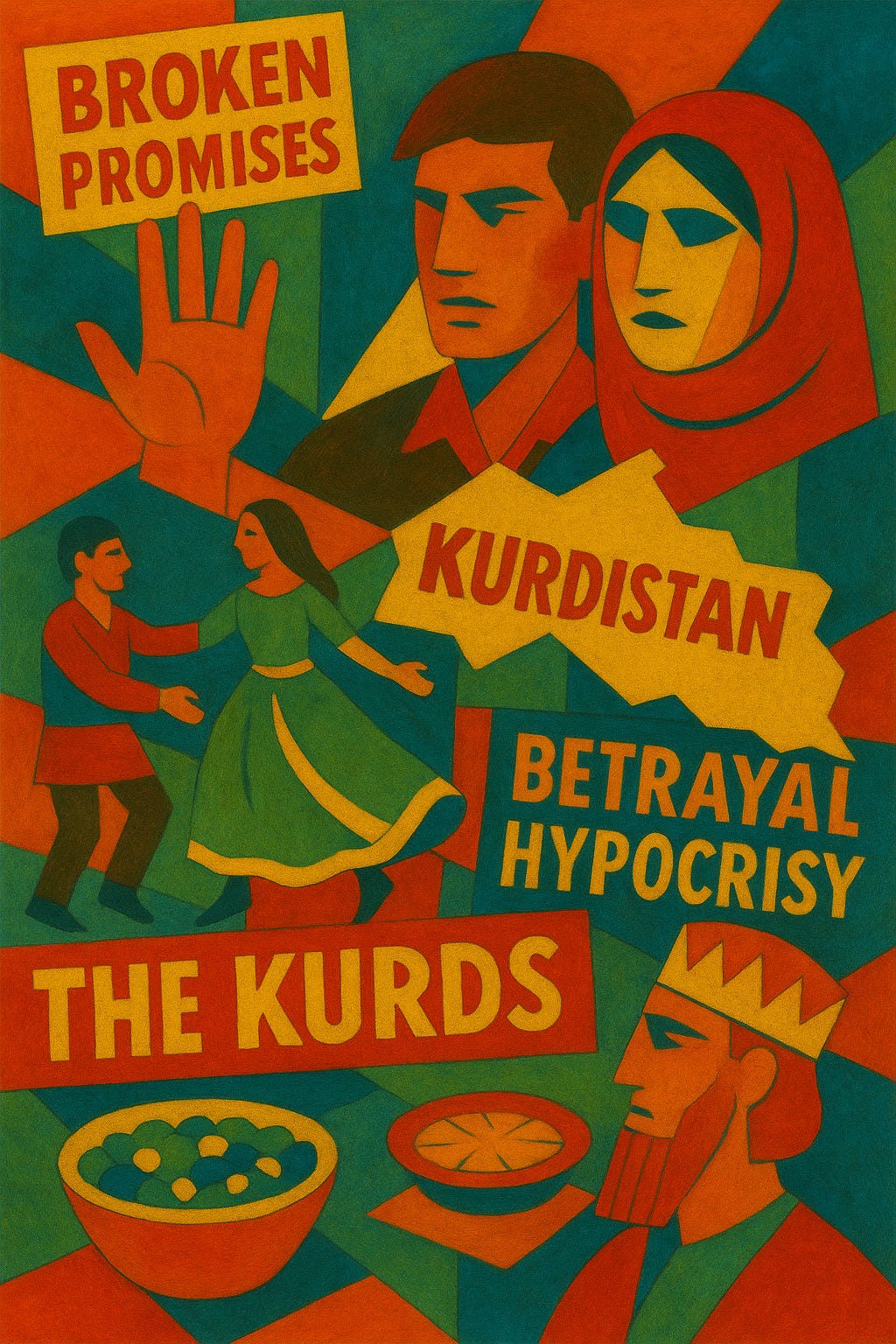The Kurds: A Forgotten People in a World Drunk on Selective Outrage
They Deserve Their Own State.
If you believe in the importance of free speech, subscribe to support uncensored, fearless writing—the more people who pay, the more time I can devote to this. Free speech matters. I am a university professor who was suspended due to criticising Hamas - so I am not speaking from the bleachers.
Please subscribe to receive at least three pieces /essays per week with open comments. It’s $6 per month, less than USD 4. Everyone says, "Hey, it’s just a cup of coffee," but please choose my coffee when you come to the Substack counter. Cheers.
I recently found myself at an interfaith potluck hosted by the admirably quixotic Tafsik organisation, a group dedicated to stitching together the frayed threads of human fellowship in an age of tribal snarling. It was a splendid affair, a kaleidoscope of faiths united in defiance of the world’s grim defaults.
Muslims and Hindus shared the stage, their music foreign to my ears, but there was a cadence that blossomed and grew, the thuds of the drums pushing forward. The bearded drummer closed his eyes for a moment, a breath drawn in, a moment when the dinner guests were pushed outside of consciousness. The harmonies ascended from the diaphragm - in that brief moment, there was nothing else but the heartbeat of the drums.
Kurdish dancers in resplendent green dresses trimmed with gold lace swirled, flashes of light sparked off the lace; the dancers’ confidence swelled with the kindness of the room, and they twirled faster.
Indians and Jews linked arms to join the dance, their laughter a fleeting rebuke to the Middle East’s perennial blood feuds. The hall pulsed, a reminder that humanity can, on occasion, transcend its stupidity and tribalism.
I attended alone, my daughter too burdened by the Sisyphean ordeal of exams to join me. Knowing only a handful among the hundreds present, I claimed a seat near the front and was promptly enveloped by a group of impeccably dressed Kurds, their warmth as disarming as their stories would prove devastating.
Among them was a journalist, a man whose patience with my ignorance was as generous as it was humbling. I confessed my knowledge of the Kurds was threadbare: I knew of the Peshmerga, legendary fighters who stare down death with a courage that shames the West’s armchair warriors; I recalled a Kurdish friend in Istanbul, a brilliant businessman, whispering of the casual bigotry he endured in Turkey, his voice hushed as if the very streets might betray him.
But beyond these fragments, I was embarrassingly adrift. I fancied myself a student of the world, yet here was a people—some 35 to 45 million strong—whose history I barely grasped. What was their story? My new friend, and I do not use the expression hyperbolically, with the grace of a teacher accustomed to the world’s amnesia, began my education in the saga of the Kurds, a people forgotten by a planet too busy posturing to notice.
To understand the Kurds’ plight—and to grasp why their case for statehood is not merely stronger than the Palestinians’ but a blazing beacon of reason in the Middle East’s carnival of chaos—one must first confront the sordid and tattered tapestry of betrayal that defines their history. It is a tale of broken promises, international cowardice, and Western hypocrisy so brazen it could make a cynic blush.
The Kurds, an ethnic group sprawling across Turkey, Iraq, Iran, Syria, and Armenia, trace their roots to the Medes, an Indo-Iranian people who helped topple the Assyrian Empire in the 7th century BCE. Their homeland, often referred to as Kurdistan, has been inhabited for millennia, with its mountains cradling a distinct culture and language that predate the Islamic conquests.
Most Kurds are Sunni Muslims, but their identity is not chained to religion; among them are Yazidis, Christians, Zoroastrians, Alevis, and secularists, a diversity that shames the monocultural fantasies of their oppressors. Yet, despite this rich heritage, they remain the world’s largest stateless nation, a fact that speaks less to their failings and more to the world’s penchant for carving up their land while pretending they don’t exist.
The Treaty of Sèvres in 1920 held out the prospect of Kurdish independence following the Ottoman Empire’s collapse, fleeting moments when the Allies seemed to entertain the notion of justice. But by 1923, the Treaty of Lausanne slammed the door shut, partitioning Kurdish lands among Turkey, Iran, and Iraq with the precision of a butcher’s cleaver.
“The Kurds,” as historian David McDowall notes, “were left with nothing but the mountains and their dreams.” Since then, their host states have treated them not as citizens but as interlopers, pests to be eradicated.
Turkey, under the guise of “national unity,” has waged a relentless war on Kurdish identity. In the 1980s and 1990s, entire villages were razed, their inhabitants displaced or worse. A Kurdish identity could earn you a terrorist label, a practice that persists today, where elected Kurdish mayors are routinely arrested on trumped-up charges.
Saddam Hussein’s Iraq opted for a more direct approach: genocide. The Anfal campaign of 1988, culminating in the chemical attack on Halabja, killed thousands in a single day, a tragedy the world barely blinked at.
In Syria, Kurds faced Arabization and denationalisation; in Iran, they endure systematic oppression. The pattern is as consistent as it is grotesque.
Yet, amidst this litany of misery, a curious twist emerges: the Kurds have consistently supported Israel, that perennial lightning rod of Middle Eastern ire.
While the region’s despots and demagogues chant “Free Palestine!” with the fervour of a televangelist, their moral outrage evaporates when it comes to the Kurds—or, for that matter, any Muslim-on-Muslim slaughter that doesn’t involve Jews. As George Orwell might have put it, “All victims are equal, but some are more equal than others.”
The Kurds’ affinity for Israel is no mystery. Both are persecuted minorities, stateless for much of their history, battered by empires and betrayed by allies. During the 1960s and 1970s, Israel provided military and logistical support to Kurdish rebels in Iraq, a pragmatic alliance that sowed seeds of goodwill. Today, Kurdish leaders openly admire Israel’s democracy, innovation, and sheer defiance in the face of existential threats. “The Kurds see in Israel a mirror of their struggle,” writes Omer Taspinar, “a people who turned adversity into strength.”
If you seek genuine solidarity in the Middle East, don’t look to the Arab League’s sanctimonious summits. Look to the Zagros and Taurus Mountains, where the Kurds, like the Jews, know the cost of survival.
The case for Kurdish statehood is not merely compelling; it is a moral and practical juggernaut compared to the Palestinian cause, which often feels less about land and more about a global fetish for demonising Jews. The Kurds have inhabited their homeland for millennia, with their cultural and linguistic identity deeply ingrained in the region’s bedrock.
The Palestinians, by contrast, are a more recent construct. As Bernard Lewis observed, “Palestinian national identity emerged primarily in opposition to Zionism, not as a pre-existing polity.” Before the 20th century, the region was a patchwork of Ottoman provinces, with no distinct Palestinian state.






